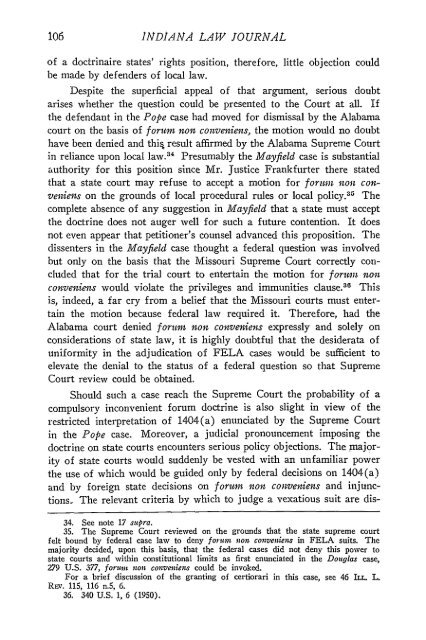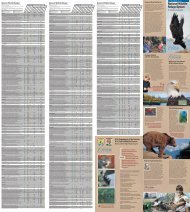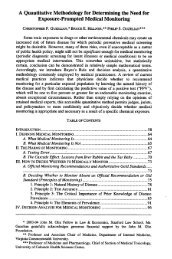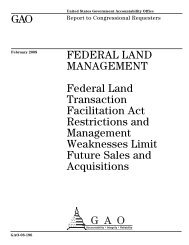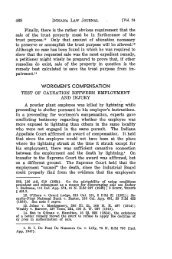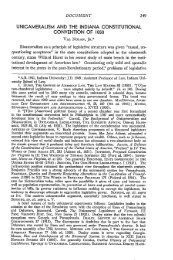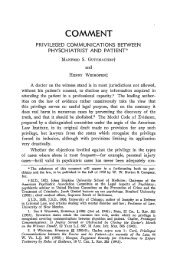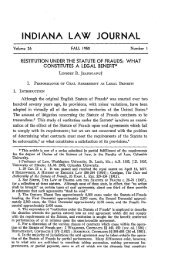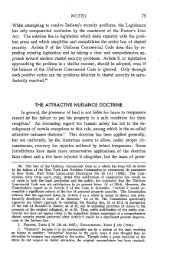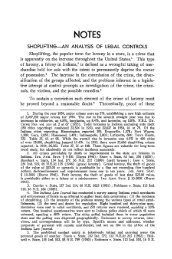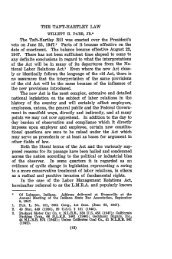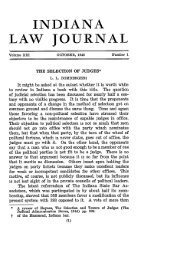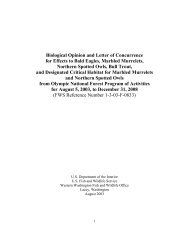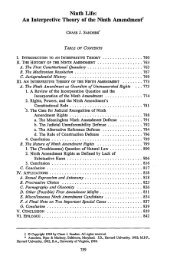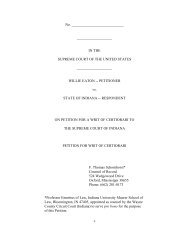fela venue abuse: necessity for congressional amendment
fela venue abuse: necessity for congressional amendment
fela venue abuse: necessity for congressional amendment
Create successful ePaper yourself
Turn your PDF publications into a flip-book with our unique Google optimized e-Paper software.
INDIANA LAW JOURNAL<br />
of a doctrinaire states' rights position, there<strong>for</strong>e, little objection could<br />
be made by defenders of local law.<br />
Despite the superficial appeal of that argument, serious doubt<br />
arises whether the question could be presented to the Court at all. If<br />
the defendant in the Pope case had moved <strong>for</strong> dismissal by the Alabama<br />
court on the basis of <strong>for</strong>um non conveniens, the motion would no doubt<br />
have been denied and this result affirmed by the Alabama Supreme Court<br />
in reliance upon local law. 34 Presumably the Mayfield case is substantial<br />
authority <strong>for</strong> this position since Mr. Justice Frankfurter there stated<br />
that a state court may refuse to accept a motion <strong>for</strong> <strong>for</strong>wom non conveniens<br />
on the grounds of local procedural rules or local policy. 3 5 The<br />
complete absence of any suggestion in Mayfield that a state must accept<br />
the doctrine does not auger well <strong>for</strong> such a future contention. It does<br />
not even appear that petitioner's counsel advanced this proposition. The<br />
dissenters in the Mayfield case thought a federal question was involved<br />
but only on the basis that the Missouri Supreme Court correctly concluded<br />
that <strong>for</strong> the trial court to entertain the motion <strong>for</strong> <strong>for</strong>umn non<br />
conveniens would violate the privileges and immunities clause. 36 This<br />
is, indeed, a far cry from a belief that the Missouri courts must entertain<br />
the motion because federal law required it. There<strong>for</strong>e, had the<br />
Alabama court denied <strong>for</strong>um non conveniens expressly and solely on<br />
considerations of state law, it is highly doubtful that the desiderata of<br />
uni<strong>for</strong>mity in the adjudication of FELA cases would be sufficient to<br />
elevate the denial to the status of a federal question so that Supreme<br />
Court review could be obtained.<br />
Should such a case reach the Supreme Court the probability of a<br />
compulsory inconvenient <strong>for</strong>um doctrine is also slight in view of the<br />
restricted interpretation of 1404(a) enunciated by the Supreme Court<br />
in the Pope case. Moreover, a judicial pronouncement imposing the<br />
doctrine on state courts encounters serious policy objections. The majority<br />
of state courts would suddenly be vested with an unfamiliar power<br />
the use of which would be guided only by federal decisions on 1404(a)<br />
and by <strong>for</strong>eign state decisions on <strong>for</strong>um non conveniens and injunctions..<br />
The relevant criteria by which to judge a vexatious suit are dis-<br />
34. See note 17 supra.<br />
35. The Supreme Court reviewed on the grounds that the state supreme court<br />
felt bound by federal case law to deny <strong>for</strong>um non conveniens in FELA suits. The<br />
majority decided, upon this basis, that the federal cases did not deny this power to<br />
state courts and within constitutional limits as first enunciated in the Douglas case,<br />
279 U.S. 377, <strong>for</strong>um non conveniens could be invoked.<br />
For a brief discussion of the granting of certiorari in this case, see 46 kt. L.<br />
REv. 115, 116 n.5, 6.<br />
36. 340 U.S. 1, 6 (1950).


